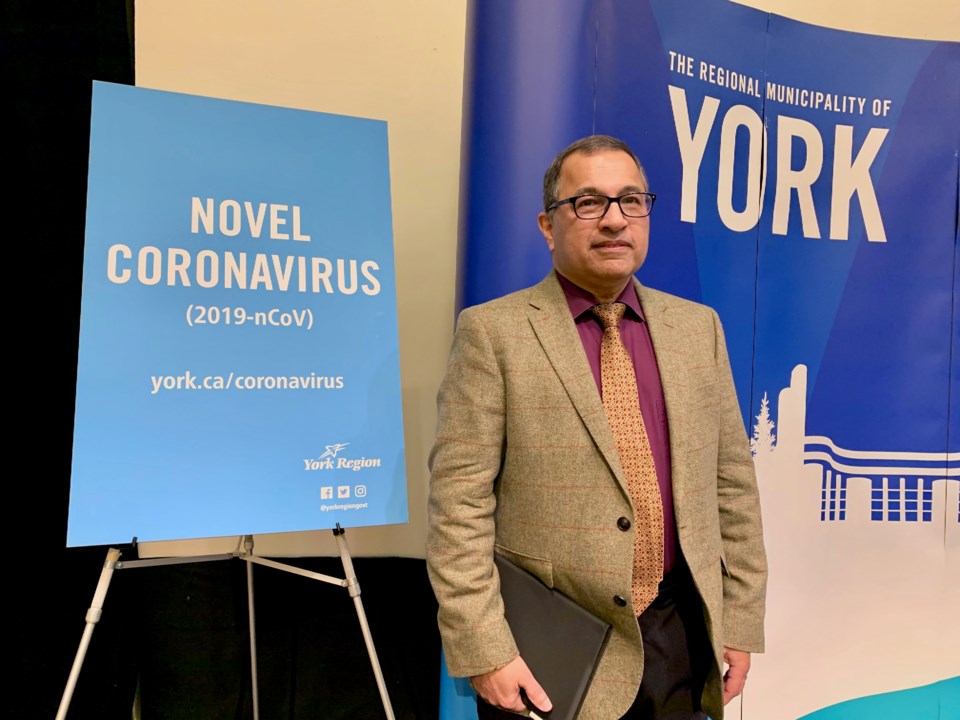Dr. Karim Kurji expected he would retire in 2020 — before the pandemic turned the world upside down.
But with a crisis at hand, York Region’s medical officer of health felt he needed to stay in his leadership role.
Now, 19 months after the pandemic began, with most of the region’s population fully vaccinated and cases staying low, Kurji is taking that retirement. He is officially marking the occasion Sept. 30, and feels confident in the public health leadership in place.
“The last 19 months have been very difficult and have often involved seven (work) days a week, and having very little by way of sleep,” Kurji told NewmarketToday. “It’s been tough on everyone. We have been extremely lucky to have competent and dedicated staff. I have to really applaud our partners, hospital partners, and our residents for having done what was required.”
COVID-19 was not the first public health crisis Kurji helped combat during his career. Before joining York Region in 2005, he held several senior positions with the Ontario Ministry of Health and Long-Term Care. He worked there during the SARS outbreak in 2003, which resulted in the deaths of 44 people in Toronto and led to the quarantining of thousands.
“We were not as well prepared. The lessons we have learned from SARS seem to have been forgotten,” Kurji said. “However, I am very proud of the fact that the community rallied together. The hospitals, the physicians, the health-care workers, everyone."
York Region got a couple of weeks ahead of neighbours in Toronto and Peel in opening its mass vaccination clinics. The result, Kurji said, was York's COVID-19 decline was a bit faster than its populous neighbours.
When asked about any regrets in the handling of COVID-19, Kurji said he would have liked to have seen more vaccines allotted to York in the third wave of the pandemic. It was a point of contention as York and the province moved to a hot spot strategy with vaccinations to address the third wave. York Region officials felt they were not being allocated enough vaccines. Still, Kurji said the hot spot strategy was effective.
“The regret is that, had the vaccines arrived a little sooner, we might have been able to dampen the third wave considerably. The reality is, within 10 days of moving into the hot spot strategy on April 8, we got our cases starting to plummet,” Kurji said. “I still believe it’s vaccination that’s got our cases down — far, far greater than any lockdown would have managed to."
Kurji's aversion to enacting lockdowns sooner in third wave earned some scorn.
One change.org petition garnered more than 3,000 signatures, demanding Kurji be fired. The petition criticized Kurji's move to not close schools as other health units had done.
“Closing schools is clearly required and Dr. Karim Kurji refuses to acknowledge this as his counterparts have already done. He needs to be removed from his role and we need a real health leader in York who cares for our health above all else,” the petition said.
Local statistician Ryan Imgrund helped fuel the campaign, accusing Kurji of manipulating data to back decisions to loosen restrictions and avoid closing schools. The confusion over hospitalization data — the York Region Public Health statistical dashboard reflected only the number of local residents who were hospitalized, not the total patient capacity at each of the region's hospitals — prompted York to remove the data from its website.
Kurji stated the data did not support closing schools April 9, though he said by the next day, the situation had changed. Ontario moved to close all in-person classes across the province as of April 19.
At the peak of the pandemic last April, the number of cases in York Region was among the highest in the province — driven by the high number of cases in the southern communities of Vaughan and Markham — below Toronto and Peel.
York Region's incidence rate hit at high of more than 283 cases per 100,000 population April 19 — Toronto exceeded 370 cases and Peel 280 at the end of April — then dropped at a faster rate than other neighbouring public health rates, even dipping below Durham at the beginning of May. The current incidence rate has remained six cases and lower throughout July.
Kurji said that kind of pressure is part of the job.
“Whenever you become a medical officer of health, you have to recognize that you will be the subject of a lot of criticism,” he said.
But he stands by his decision-making at the time, noting lockdowns are damaging to people's well-being. He said those decisions were based on data considered carefully by experts — and that not all of the data is made publicly available.
“The fact that some people felt we had manipulated the data is totally incomprehensible to me. They were probably analyzing the data in a totally wrong way, and that is all that I can say,” Kurji said. “There were so many nuances that I think were misrepresented by others.
“I have no regrets at all,” he added.
Despite the criticism Kurji faced, York Region officials stood by their medical officer of health. Chairman and CEO Wayne Emmerson wished Kurji well upon the retirement announcement.
“On behalf of York Regional Council, I want to thank Dr. Kurji for his professionalism, dedication and commitment to supporting the health and well-being of the more than 1.2 million residents who call York Region home,” Emmerson said.
Kurji said he hopes to spend more time with his grandchildren and developing himself spiritually.
He offered his appreciation to the York Region community for following public health recommendations.
“This hasn’t just been my leadership,” Kurji said. “This really has been a question of all of us working together.”
